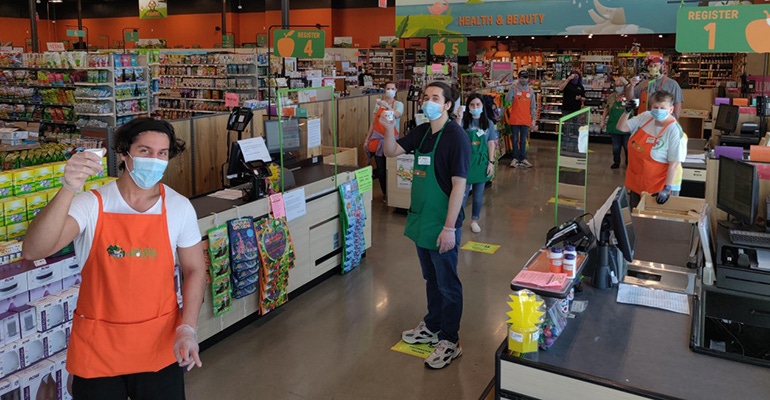Natural Grocers reports double-digit growth, private-label shortages
Shareholders will receive a third consecutive dividend of 7 cents per share on 20% net sales increase.

Many large natural and conventional grocery retailers saw comparable-store sales surge as the coronavirus spread in late March: The Kroger Co. reported a 30% increase in March; Sprouts Farmers Market saw sales grow 26%; and Albertsons' rose 47%.
Lakewood, Colorado-based Natural Grocers—a smaller chain of 157 natural and organic food stores in 20 states—saw similar results, with comparable-store sales growth of 40% in March.
For the entire quarter, which ended March 31, net sales grew 20.4% to $277.5 million. Comparable-store sales increased 17% and mature-store comparable sales rose 15.4% during the quarter, the company reported.
It's the 12th consecutive quarter that Natural Grocers has reported sale growth.
The company will pay stockholders a dividend of 7 cents per share on June 16. The company began paying dividends after the fiscal year 2019, which ended Sept. 30. All three payouts have been for the same amount.
"We saw both a significant increase in average transaction size, which increased 13.1% during the second quarter, and an acceleration in transaction counts, which were up 3.5% during the quarter," Natural Grocers Co-president Kemper Isely said during a conference call Thursday.
High sales continued in April, but at a slower pace. So far in May, transactions still tend to be higher, but traffic has decreased, he said.
Even before the coronavirus-related sales surge, comparable-store sales had reached the high end of the company's full-year expectations, Chief Financial Officer Todd Dissinger said.
"We are operating in a rapidly changing and unprecedented period. During the quarter, we witnessed a daily average comparable store sales gains that we have not experienced in the company's history," Dissinger said.
Natural Grocers also reported increases in other financial measures:
Gross profit margin was 28%, compared to 27% in the second quarter of 2019. Gross profit for the first quarter of 2020 was 26.3%.
Operating income increased 116.6% to $13.3 million.
Net income increased 151.8% to $9.7 million with diluted earnings per share of $0.43.
EBITDA increased 57.7% to $21.1 million.
The improvement in gross margin was due to improvement in store occupancy and shrink expenses, as well as a favorable shift in the product mix sold, Dissinger said.
Private-label products sold well, but the resulting strain on the supply chain led to some products being out of stock at the end of the quarter, Dissinger said.
Isely said store expenses fell 130 basis points, despite increased costs—raising wages, hiring temporary staff and additional, more thorough cleaning—associated with coronavirus and protecting employees as well as customers.
"We have proactively implemented numerous measures in response to the pandemic to provide a safe working and shopping environment," Isely said.
About the Author
You May Also Like





